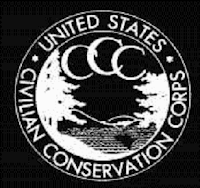 Somewhere out there is the September 1935 issue of Radio News with the article "Radio in the CCC." That one article is the only one I am aware of that directly addresses this topic. Until I read it I remain somewhat in the dark on this arcane topic. (please anyone?)
Somewhere out there is the September 1935 issue of Radio News with the article "Radio in the CCC." That one article is the only one I am aware of that directly addresses this topic. Until I read it I remain somewhat in the dark on this arcane topic. (please anyone?)The CCC was the Civilian Conservation Corps a public work relief program for unemployed men, focused on natural resource conservation from 1933 to 1942. It was part of President Roosevelt's New Deal program. While much of it is today derided as "liberal" the CCC actually was first suggested by Michigan Senator James Couzens [R]. There are few books on the program leaving us with our grandparents as the best sources of information. Notably here and here.
 The men of the CCC planted treed, (about three billion trees) fought soil erosion, fought forest fires, built fish hatcheries, built drainage systems and levys, constructed roads and more. In 1933 they began offering their enrollees vocational training. This training included radio. They had shortwave classes, radio theory, taught Morse code, and operated the CCC radio network including the stations WUGA, WUGN, WUGF, WUGT, WUGH, WUGR, WUMA, WUGP, WUGL, WUGE, WUGG, WUGC, WUGU, WUGB, WUCC and certainly others. The Campt at Ft. Benn
The men of the CCC planted treed, (about three billion trees) fought soil erosion, fought forest fires, built fish hatcheries, built drainage systems and levys, constructed roads and more. In 1933 they began offering their enrollees vocational training. This training included radio. They had shortwave classes, radio theory, taught Morse code, and operated the CCC radio network including the stations WUGA, WUGN, WUGF, WUGT, WUGH, WUGR, WUMA, WUGP, WUGL, WUGE, WUGG, WUGC, WUGU, WUGB, WUCC and certainly others. The Campt at Ft. Benn ing actually had their own newsletter The Amplifier. They conducted code drills transcribing timed broadcast from WLM in D.C. There is a great page here.
ing actually had their own newsletter The Amplifier. They conducted code drills transcribing timed broadcast from WLM in D.C. There is a great page here.But we know precious little about these stations. That single issue of The Amplifier tells me that WUGR was in Chipley, GA. WUGP was in Brooksville, FL, WUGN in Woodville FL, was in Tampa, WUGE, WUGF in Starko, FL etc. There were 20 stations in the District "H" Radio Network for the CCC. District H included Florida, and parts of southern Alabama and Georgia. there were at least another dozen equally large networks. The then disappeared. I can only assume with the dissolution of the CCC their funding dried up. I also assume that the stations on some military bases like Ft. Benning may have found some extended life in the war-time effort but alas this is only a guess.
Despite wide popularity the program never became permanent. In 1939 Congress passed it's last funding extension. In December of 1941 following the attack on Pearl Harbor funding was cut to prepare for war.




No comments:
Post a Comment